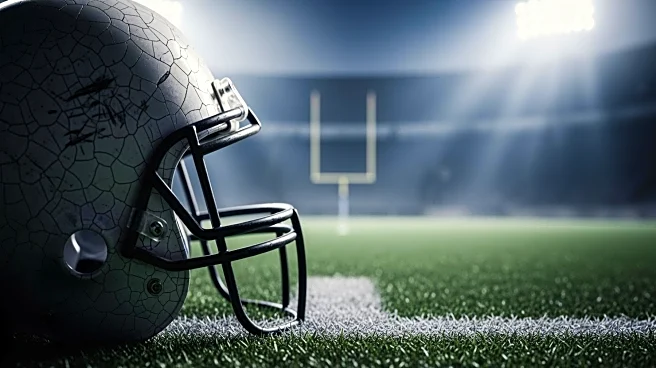What's Happening?
Desmond Reid, a running back for the Pittsburgh Panthers, suffered an injury during a game against Notre Dame, exacerbating an already challenging day for the team. Reid, known for his explosive play and
significant contributions to the passing game, was forced to leave the field midway through the third quarter. At the time of his exit, Pittsburgh was trailing Notre Dame 28-3. Reid's injury appeared severe, as he required assistance from multiple teammates to leave the field, unable to put weight on his legs. He was subsequently taken to the blue medical tent for further evaluation. This injury follows a previous ankle issue Reid has dealt with this season, raising concerns about his availability for the Panthers' remaining ACC games.
Why It's Important?
Reid's injury is a significant setback for the Pittsburgh Panthers, who rely on his dynamic abilities in their offensive strategy. His absence could impact the team's performance in their final ACC games, potentially affecting their standings and postseason opportunities. The loss of a key player like Reid can also influence team morale and strategy adjustments, as coaches may need to reconfigure their lineup and play calls. For Reid, the injury poses a personal challenge, as it may hinder his development and visibility in collegiate football, affecting his future prospects in the sport.
What's Next?
The Pittsburgh Panthers will be closely monitoring Reid's recovery, hoping for his return in the final ACC games. The coaching staff may need to explore alternative strategies and player rotations to compensate for Reid's absence. Additionally, medical evaluations will determine the extent of Reid's injury and his potential timeline for recovery. The team and fans will be awaiting updates on Reid's condition, as his presence on the field is crucial for the Panthers' competitive edge.
Beyond the Headlines
Reid's injury highlights the physical demands and risks associated with collegiate football, raising questions about player safety and injury prevention measures. It also underscores the importance of depth in team rosters, as injuries can quickly alter the dynamics of a season. The situation may prompt discussions on improving medical support and recovery protocols for athletes, ensuring they receive adequate care and rehabilitation.









